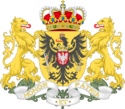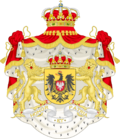Politics of Nikolia: Difference between revisions
m (1 revision imported) |
No edit summary |
||
| Line 1: | Line 1: | ||
{{Politics of Nikolia}} | |||
The '''politics of Nikolia''' take place in a framework of a {{wp|federalism|federal}} {{wp|parliamentary system|parliamentary}} {{wp|constitutional monarchy}}. The political system is laid out in 1925 Constitution which abolished the Empire, absolute monarchy, and democratised the country by establishing a clear separation of powers and limited power of the monarch. The executive branch is composed of [[Monarchy of Nikolia|the Monarch]] and the cabinet, known as the [[Crown Council of Nikolia|Crown Council]], an executive governmental council, chaired by the [[Chancellor of Nikolia|Chancellor]] which is equal to a {{wp|prime minister}} in other democracies. The bicameral parliament consists of an upper house, [[Council of Voivodeships]] with 150 representatives from 24 [[Voivodeships of Nikolia]] with proportional representation and a lower house, [[National Assembly of Nikolia]] with 650 MP's elected on a four year term by means of universal suffrage (18 years minimum age) in a system of constituency voting. | |||
The legal system of Nikolia follows principles of {{wp|civil law (legal system)|civil law}} codified in the most important code, the [[Civil Code of Nikolia]]. The judiciary system follows a hierarchy of courts, with [[Supreme Court of Cassation (Nikolia|Supreme Court of Cassation]] as the highest court in the system. The court of equal importance and status is the [[Constitutional Court of Nikolia]], which is not directly part of the court hierarchy, as it deals with the questions of constitutionality. | |||
==History== | |||
==Constitution== | ==Constitution== | ||
{{main|Constitution of Nikolia}} | |||
==Executive branch== | ==Executive branch== | ||
{{main|Crown Council of Nikolia}} | {{main|Crown Council of Nikolia}} | ||
The executive powers rest within the [[Monarchy of Nikolia| | The executive powers rest within the [[Monarchy of Nikolia|Nikolian monarch]] and the [[Crown Council of Nikolia|Crown Council]]. The Crown Council is supreme governmental council which brings together the principal officers of the Executive Branch of the Nikolian government. This include the chairman of the government, the [[Chancellor of Nikolia]] and ministers of government departments. | ||
===Nikolian monarch=== | |||
===Crown Council=== | |||
====Chancellor==== | |||
==Legislative branch== | ==Legislative branch== | ||
[[File:WienParlament.jpg|thumb|right|250px|[[Parliament Palace (Nikolia)|Parliament Palace]] in Carigrad, seat of both houses of the Nikolian parliament]] | |||
The legislature of Nikolia take place in a {{wp|bicameral legilature|bicameral}} parliament consisiting of an upper house, [[Council of Voivodeships]], with 150 representatives from 24 [[Voivodeships of Nikolia]] with proportional representation and a lower house, [[National Assembly of Nikolia]] with 650 MP's elected on a four year term by means of universal suffrage (18 years minimum age) in a system of constituency voting. | |||
===Council of Voivodeships=== | |||
{{main|Council of Voivodeships}} | |||
The main characteristic of the Nikolian federalism is that Voivodeships are directly involved in the legislative system on Kingdom level. That is achieved by Council of Voivodeships, an upper house of the Nikolian parliament. It consists of 150 delegates from 24 Voivodeships with proportional representation depending on the Voivodeship population. Delegates are appointed by their respective Voivodeship parliaments without fixed term of office, therefore composition of the Council varies depending on the election results in Voivodeship parliaments. | |||
The Council of Voivodeships serves as a channel of communication between the Voivodeships and the Kingdom. Through the Council, Voivodeships participate in legislature and administration of the Kingdom, and shapes its political goals and foreign policy. | |||
The basic tasks of the Council of Voivodeships are: | |||
# Participate in legislative process | |||
# Participates in solving administrative questions of the Kingdom | |||
# Participates in decision making regarding political goals and foreign policy of the Kingdom | |||
The Council of Voivodeships is headed by the President appointed from one of the Voivodeships for a 6 month term on a rotational basis. Secretary of the Council and its deputies are the only functions in the Council with a fixed 4 year term. Role of the Secretary is to communicate with the government and the National Assembly and inform the Council on future legislative initiatives. | |||
===National Assembly of Nikolia=== | |||
{{main|National Assembly of Nikolia}} | {{main|National Assembly of Nikolia}} | ||
[[File:Sitzungssaal des Abgeordnetenhauses, Parlament, Wien.jpg|thumb|left|250px|National Assembly meeting hall in the [[Parliament Palace (Nikolia)|Parliament Palace]]]] | |||
===Elections=== | |||
==Judicial branch== | |||
[[Category:Nikolia]][[Category:Astyria]][[Category:Politics of Nikolia]] | [[Category:Nikolia]][[Category:Astyria]][[Category:Politics of Nikolia]] | ||
{{Nikolia topics}} | |||
Revision as of 01:20, 2 October 2020
 |
|---|
| This article is part of a series on the politics and government of Nikolia |
|
|
The politics of Nikolia take place in a framework of a federal parliamentary constitutional monarchy. The political system is laid out in 1925 Constitution which abolished the Empire, absolute monarchy, and democratised the country by establishing a clear separation of powers and limited power of the monarch. The executive branch is composed of the Monarch and the cabinet, known as the Crown Council, an executive governmental council, chaired by the Chancellor which is equal to a prime minister in other democracies. The bicameral parliament consists of an upper house, Council of Voivodeships with 150 representatives from 24 Voivodeships of Nikolia with proportional representation and a lower house, National Assembly of Nikolia with 650 MP's elected on a four year term by means of universal suffrage (18 years minimum age) in a system of constituency voting. The legal system of Nikolia follows principles of civil law codified in the most important code, the Civil Code of Nikolia. The judiciary system follows a hierarchy of courts, with Supreme Court of Cassation as the highest court in the system. The court of equal importance and status is the Constitutional Court of Nikolia, which is not directly part of the court hierarchy, as it deals with the questions of constitutionality.
History
Constitution
Executive branch
The executive powers rest within the Nikolian monarch and the Crown Council. The Crown Council is supreme governmental council which brings together the principal officers of the Executive Branch of the Nikolian government. This include the chairman of the government, the Chancellor of Nikolia and ministers of government departments.
Nikolian monarch
Crown Council
Chancellor
Legislative branch

The legislature of Nikolia take place in a bicameral parliament consisiting of an upper house, Council of Voivodeships, with 150 representatives from 24 Voivodeships of Nikolia with proportional representation and a lower house, National Assembly of Nikolia with 650 MP's elected on a four year term by means of universal suffrage (18 years minimum age) in a system of constituency voting.
Council of Voivodeships
The main characteristic of the Nikolian federalism is that Voivodeships are directly involved in the legislative system on Kingdom level. That is achieved by Council of Voivodeships, an upper house of the Nikolian parliament. It consists of 150 delegates from 24 Voivodeships with proportional representation depending on the Voivodeship population. Delegates are appointed by their respective Voivodeship parliaments without fixed term of office, therefore composition of the Council varies depending on the election results in Voivodeship parliaments.
The Council of Voivodeships serves as a channel of communication between the Voivodeships and the Kingdom. Through the Council, Voivodeships participate in legislature and administration of the Kingdom, and shapes its political goals and foreign policy.
The basic tasks of the Council of Voivodeships are:
- Participate in legislative process
- Participates in solving administrative questions of the Kingdom
- Participates in decision making regarding political goals and foreign policy of the Kingdom
The Council of Voivodeships is headed by the President appointed from one of the Voivodeships for a 6 month term on a rotational basis. Secretary of the Council and its deputies are the only functions in the Council with a fixed 4 year term. Role of the Secretary is to communicate with the government and the National Assembly and inform the Council on future legislative initiatives.
National Assembly of Nikolia

Elections
Judicial branch
